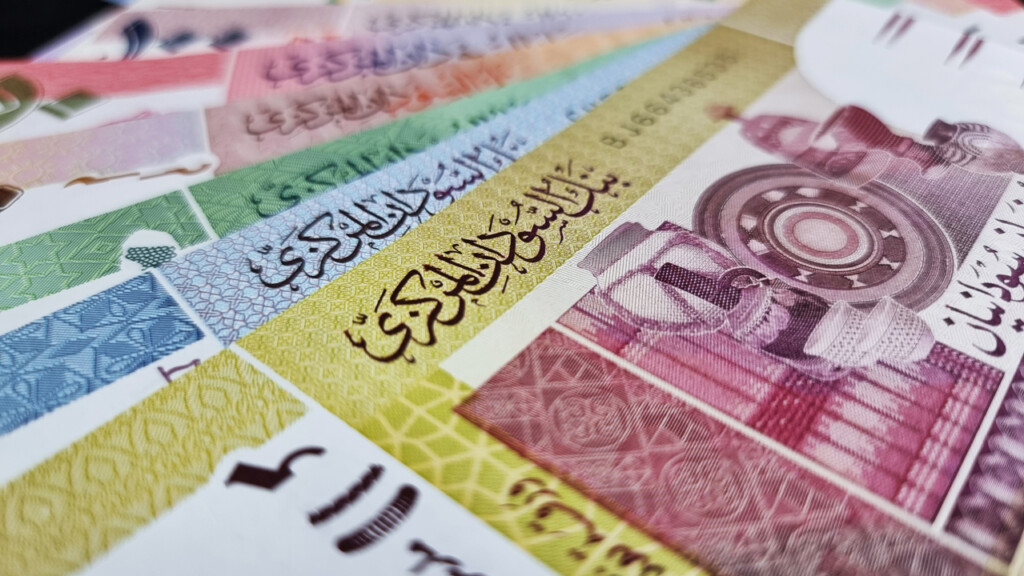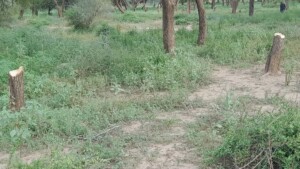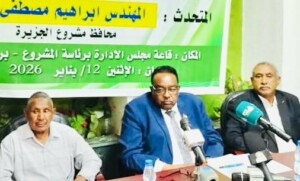Banking expert warns of ‘dollarisation’ of Sudanese economy

Sudanese banknotes (File photo: AMB / RD)
Banking expert Omar Sidahmed has warned of the dangers of adopting the US Dollar and other foreign currencies as an alternative to the Sudanese Pound, following the spread of counterfeit banknotes in several parts of the country. He told Radio Dabanga yesterday that 97 per cent of the economic activities in Sudan are out of the jurisdiction of the Ministry of Finance.
Last week, North Kordofan security officers seized a large number of counterfeit 500-pound notes at the city market of El Obeid, the state capital.
Sidahmed, who served as director of the Abu Dhabi Bank and the Export Development Bank, explained in an interview with Radio Dabanga correspondent Suleiman Sari yesterday that “the circulation of forged Sudanese banknotes is far from new” in the country.
“In the wake of the 2018 December Revolution, a gang of money forgers was arrested. Their photos were published on the news, but as usual, the deep state in such cases was not investigated and no results were reached,” he said. “As for the current situation, forged banknotes have become a common phenomenon in all cities of Sudan – as a result of the chaos in the country.”
Following the outbreak of the war between the Rapid Support Forces (RSF) and the Sudanese Armed Forces (SAF) in mid-April last year, “RSF paramilitaries stormed the national currency printing press and took ready-made rolls that did not have yet a serial number nor a signature, which means they do not have any value.”
Beyond control
He said that “an estimated 97 per cent of the economic activities in Sudan are out of the jurisdiction of the Ministry of Finance.
“The real problem is not the counterfeiting, but the complex economic situation related to the fact that 97 per cent of the monetary mass is beyond the control of the banks, and therefore the state cannot control the size of this mass.”
After lengthy discussions of a group of economists, “we reached the conclusion that the size of the monetary mass is equal to 900 trillion pounds, a very large amount, of which only three per cent is available within the banking system”.
‘Dollarisation can be considered the ultimate collapse of the Sudanese Pound, and its catastrophic consequences will be countless.’ – banking expert Omar Sidahmed
He said that “the monetary mass is present in homes, companies, and in the hands of merchants. There are even people who have fortified rooms designed inside their homes.
“The people have lost confidence in the banking system, in its digital applications, and its inability to quickly return to their service. This is what made people stick to dealing with cash money.”
The banking expert warned of the dangers of ‘dollarisation’ of the Sudanese economy. “This happens when the people rely on using dollars and other foreign currencies after losing confidence in the national currency as a result of rampant counterfeiting. It is also possible that the dollarisation is also the result of the collapse of the national currency against the price of the dollar, which rises every day,” he explained.
“Dollarisation can be considered the ultimate collapse of the Sudanese Pound, and its catastrophic consequences will be countless.”
Collapsed
Sidahmed added: “When we say that the banking system ‘collapsed’, we do so by analogy with war conditions and the banks’ delay in resuming their activities. Most of the banks do not adhere to the requirements for responding to disasters, including taking the necessary precautions, such as operating the electronic banking system from safe alternative locations, outside the capital or perhaps outside Sudan, or maintaining backup servers.
“The markets did suffer a lot after the sabotage that struck the main websites of the banks, especially the crop and gold markets and other markets where cash is traded in large volumes.”
He questioned “the willingness and ability of the Central Bank of Sudan and other banks to provide an electronic alternative to transactions in light of the cessation of communications networks that operate at a quarter of their capacity, for the same reason that banks did not adhere to the requirements for speedy recovery from disasters”.
‘Economic recipes’
He said that “one of the recipes to address the crisis of the banking system, which is an entry point to address the Sudanese economic crisis, is changing the currency on the condition it is done in accordance with the known standards and controls.
“The most important criterion for changing currency is the existence of a state and a ruling system with respected political authorities and high-level monetary authorities that are not subject to interference. So, changing the currency in wartime conditions is an inappropriate measure.”
The banker believes that the “basic treatment of the problem of valueless or forged banknotes is to have financial inclusion, with mergers or liquidation of banks, so that three or four large banks remain out of the current 41 banks. These large banks will of course have much larger financial capabilities and will be able to deal with international banks”.
Already before the war broke out last year, the Sudanese economy was in a dire situation. In February 2021, the low-income country was in the midst of an economic and political transition. The Khartoum government of PM Abdalla Hamdok effectively floated the Pound and unified the official and parallel exchange rates in an attempt to control the rising inflation and attract foreign investors.
According to a Dutch report published at the time, 13.5 per cent of the people in Sudan were living in extreme poverty (less than USD 1.90 per day) and 46 per cent in moderate poverty (less than USD 3.20 per day) in 2014. Poverty was still significantly higher in rural areas but has risen sharply in urban areas in recent years, according to the report. For instance, in Khartoum state, extreme poverty climbed from 3.3 per cent in 2009 to 9.4 per cent in 2014.











 and then
and then